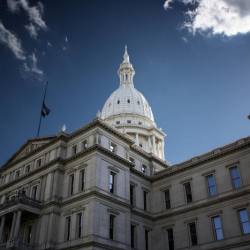
This version lowers the Gross Gaming Revenue tax by 7% and allows an operate-by-compact option for tribal casinos.
Michigan lawmakers once again are backing House Bill 4926, which would legalize and regulate online poker and casinos in the state. The bill would authorize the Michigan Gaming Control Board to create the Michigan Internet Gaming Division, which would develop online gambling regulations.
The legislation proposes to open online casino and poker sites licensing to commercial land-based casinos and brick-and-mortar tribal casinos in the state. Roughly 25 different distinct gaming portals might appear, though it is uncertain whether Michigan’s Internet Gaming Division would allow multiple skins for one license holder.
HB 4926 was introduced by Rep. Brandt Iden, Rep. Kathy Crawford, Rep. Klint Kesto, and Rep. Robert L. Kosowski on Sept. 12, 2017. Since that time, HB 4926 failed to gain much traction, but several events have changed since the bill’s introduce 8 months ago. New Jersey joined the Multi State Internet Gaming Association (MSIGA), an interstate gaming compact with Nevada and Delaware which shares online poker players.
Joining the MSAGI would make online poker more profitable for Michigan, because sharing player liquidity increases tournament fields and guaranteed prize pools. That in turn increases the number of Michigan players who might be interested in online tournaments or cash games, so that a critical mass of popularity eventually is reached.
Nearby Pennsylvania also passed online poker in October 2017, so another potential addition to the MSIGA could sign on to the poker compact in the coming months.
House Bill 4926: Michigan Online Gambling
House Bill 4926 would institute a small licensing application fee of $100,000, along with a $200,000 licensing fee once the application is approved. After the initial fees, an online gaming operator would only have to pay $100,000 a year to maintain its licensed status. In Pennsylvania, online gaming licenses cost as much as $10 million.
Michigan online gambling also would mandate the creation of a state-run hotline for problem gamblers. A self-exclusion list would be created, where a problem gambler could ban themselves from online gambling for 1 year, 5 years, or lifetime. Self-exclusion bans work on the assumption that compulsive gamblers join the list in their quieter moments, before the compulsion to gamble rampantly strikes them. Self-bans have worked in the United Kingdom, Australia, and New Jersey.
Michigan Self-Exclusion List
Self-exclusion lists would be exempt from Freedom of Information (FOI) requests, meaning a problem gambler’s decision to self-ban would remain private and could not be used against them later. Michigan online gambling also would institute an age limit of 21 or older.
Brandt Iden’s Online Gambling Support
Brandt Iden has tried several times to pass a Michigan online gambling bill. While the legislation has gained some success in the House of Representatives, it never has reached a full vote in the Michigan Senate. The 2018 version of the bill lowers the Gross Gaming Revenue (GGR) tax on gross revenues from 15% to 8%, in an effort to gain wider support from Michigan’s land-based gaming operators.
In an attempt to gain support from Michigan’s nearly two dozen tribal casino operators, Rep. Brandt Iden included an “operate-by-compact” option for the tribal casinos. Earlier versions of HB 4926 would have required Native American gaming authorities to renegotiate their gaming compact with the state, a stipulationu which put the tribes at a severe disadvantage.
Michigan Sports Betting
The 2018 Michigan online gambling bill also approves land-based sports betting, if the US Supreme Court strikes down the Professional and Amateur Sports Protection Act (PAPSA). PASPA has banned land-based sportsbooks in 46 US states for the past 25 years, but is being challenged by New Jersey in the Supreme Court. The high court is expected to announce its decision any day now.
Michigan was one of 20 US states to sign an amicus brief supporting New Jersey’s position on sports betting. Up to 18 states might legalize sports betting at their land casinos, if the Supreme Court strikes down PASPA. The sports betting provision could prove a stumbling block for Michigan, because it is more complicated for tribal casinos.
National Indian Gaming Association
The National Indian Gaming Association recently announced it was in favor of state governments legalizing sports betting and imposing new regulations — as long as certain conditions were met by state governments. The gaming association’s stance could smooth the way for sports betting legislation in a number of states, including Michigan.
If House Bill 4926 were passed by the end of the June 2018 session of the Michigan legislature, the state could launch online casinos and poker sites by the 2nd half of 2019.
